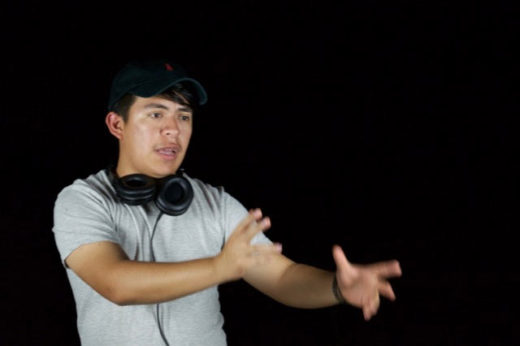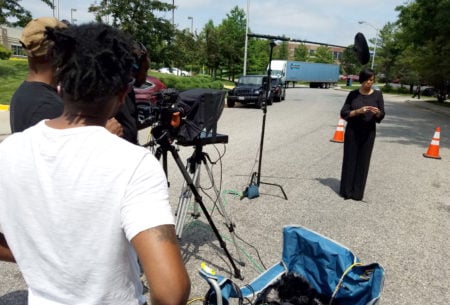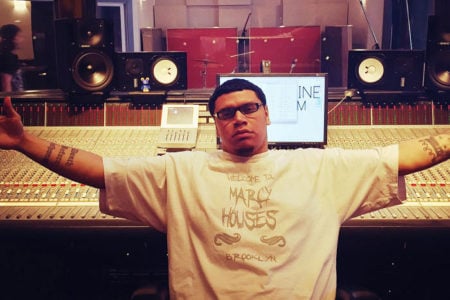Please fill out the following information, and RRFC Admissions will contact you to discuss our program offerings:
Issue #132
by L. Swift and Jeff McQ

Film Connection grad Jonathan Ramos
 “I got into recording through the technical side of things. I was interested in checking it out and trying to record, so my brother and I bought some cheap software, found a toy microphone, and we gave it a go. I found that it was really interesting to me to work to manipulate the recordings to try to get the sound we wanted. I was interested in music, but it never really dawned on me that recording music was a job that people did. When I found that out in college, I thought ‘I’m going to give it a shot.’ I started to study audio formally instead of just on my own. I really fell in love with it. It became something that was really engaging to me on a lot of levels.”
HIS THOUGHTS ON THE RECORDING CONNECTION TEACHING APPROACH VERSUS TRADITIONAL EDUCATION:
“I went through a traditional four-year style school. In my final semester, I started an internship and I found that I was learning a lot of things that I’d never learned about in school. I was three semesters in at my school before I was doing some of the stuff that I might have my students do in their first week of the Recording Connection program. There are a lot of different audio programs out there. How effective any program is going to be for you personally really depends on what you put into it. You could really dive into any program and get something out of it, but I think Recording Connection provides an opportunity to do that in a different and more efficient way because it isn’t isolated from reality.”
ON THE IMPORTANCE OF COMBINING KNOWLEDGE WITH HANDS-ON EXPERIENCE IN THE STUDIO:
“To me, there’s a separation between knowledge and understanding. The one-on-one times are giving a lot of knowledge…If you’re working on it, you’re getting knowledge. But it’s up to any given individual to turn that knowledge into understanding. The way to do that is through experience…
I can think of early on when I was at the studio that I’m at now, I had almost no experience on the type of mixing boards that we have there. The routing and the flexibility of SSL consoles is much more elaborate than your average mixing board. I would see some of the other engineers use the console in ways I was unfamiliar with. I’d say to myself, ‘Okay, I know that they’re doing this technique,’ but I wasn’t sure how they set it up. So I’d read the manual for the console and think, ‘Okay, so they’re pushing this button, they’re doing that.’ But it wasn’t until I was running my own sessions and doing it all myself that I could say, ‘Okay. Here’s the process of setting up this particular routing, this particular technique…this all is making sense now and I can do this.’ After reading the manual, I had a certain amount of knowledge… But the actual doing of it begins to unlock understanding. So in terms of my students, something that I tell them in our one-on-one lessons is that I’m going to tell you about a lot of things, I’m going to demonstrate a lot of things, and we’re going to do some of them together. I’m going to give you the opportunity to gain knowledge, but you have to be practicing these things on your own if you actually want to understand.”
“I got into recording through the technical side of things. I was interested in checking it out and trying to record, so my brother and I bought some cheap software, found a toy microphone, and we gave it a go. I found that it was really interesting to me to work to manipulate the recordings to try to get the sound we wanted. I was interested in music, but it never really dawned on me that recording music was a job that people did. When I found that out in college, I thought ‘I’m going to give it a shot.’ I started to study audio formally instead of just on my own. I really fell in love with it. It became something that was really engaging to me on a lot of levels.”
HIS THOUGHTS ON THE RECORDING CONNECTION TEACHING APPROACH VERSUS TRADITIONAL EDUCATION:
“I went through a traditional four-year style school. In my final semester, I started an internship and I found that I was learning a lot of things that I’d never learned about in school. I was three semesters in at my school before I was doing some of the stuff that I might have my students do in their first week of the Recording Connection program. There are a lot of different audio programs out there. How effective any program is going to be for you personally really depends on what you put into it. You could really dive into any program and get something out of it, but I think Recording Connection provides an opportunity to do that in a different and more efficient way because it isn’t isolated from reality.”
ON THE IMPORTANCE OF COMBINING KNOWLEDGE WITH HANDS-ON EXPERIENCE IN THE STUDIO:
“To me, there’s a separation between knowledge and understanding. The one-on-one times are giving a lot of knowledge…If you’re working on it, you’re getting knowledge. But it’s up to any given individual to turn that knowledge into understanding. The way to do that is through experience…
I can think of early on when I was at the studio that I’m at now, I had almost no experience on the type of mixing boards that we have there. The routing and the flexibility of SSL consoles is much more elaborate than your average mixing board. I would see some of the other engineers use the console in ways I was unfamiliar with. I’d say to myself, ‘Okay, I know that they’re doing this technique,’ but I wasn’t sure how they set it up. So I’d read the manual for the console and think, ‘Okay, so they’re pushing this button, they’re doing that.’ But it wasn’t until I was running my own sessions and doing it all myself that I could say, ‘Okay. Here’s the process of setting up this particular routing, this particular technique…this all is making sense now and I can do this.’ After reading the manual, I had a certain amount of knowledge… But the actual doing of it begins to unlock understanding. So in terms of my students, something that I tell them in our one-on-one lessons is that I’m going to tell you about a lot of things, I’m going to demonstrate a lot of things, and we’re going to do some of them together. I’m going to give you the opportunity to gain knowledge, but you have to be practicing these things on your own if you actually want to understand.”

Control Room in Rax Trax

Photo taken by Sainbileg Battulga while on a shoot with FC mentor Six Cobb
 Recording Connection student Maximilian Garrison aka Madd Maxx (Manhattan, NY) is committed to the program even when times are tough. “I have been struggling in my personal life but it’s actually the program that keeps me balanced because being around other likeminded individuals and working with the tools I’m being given keeps me motivated, humble, and focused on the big picture. The engineers and other apprentices have been nothing but supportive of EVERYONE, including myself…It’s been a real pleasure to learn with the ease of hands-on and direct teaching from those who have helped create monster Grammy award winning hits. Patience is perseverance is all that is needed, then the sky’s the limit.”
Recording Connection student Maximilian Garrison aka Madd Maxx (Manhattan, NY) is committed to the program even when times are tough. “I have been struggling in my personal life but it’s actually the program that keeps me balanced because being around other likeminded individuals and working with the tools I’m being given keeps me motivated, humble, and focused on the big picture. The engineers and other apprentices have been nothing but supportive of EVERYONE, including myself…It’s been a real pleasure to learn with the ease of hands-on and direct teaching from those who have helped create monster Grammy award winning hits. Patience is perseverance is all that is needed, then the sky’s the limit.”

RRFC is education upgraded for the 21st century.
Get the latest career advice, insider production tips, and more!
Please fill out the following information, and RRFC Admissions will contact you to discuss our program offerings:
Stay in the Loop: Subscribe for RRFC news & updates!
© 2025 Recording Radio Film Connection & CASA Schools. All Rights Reserved.


